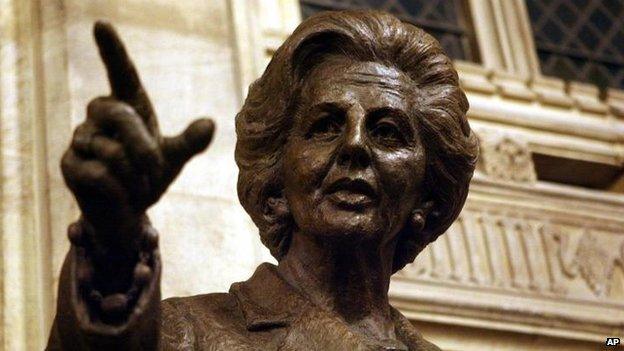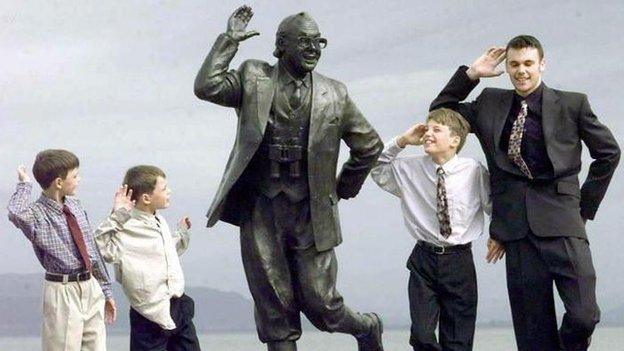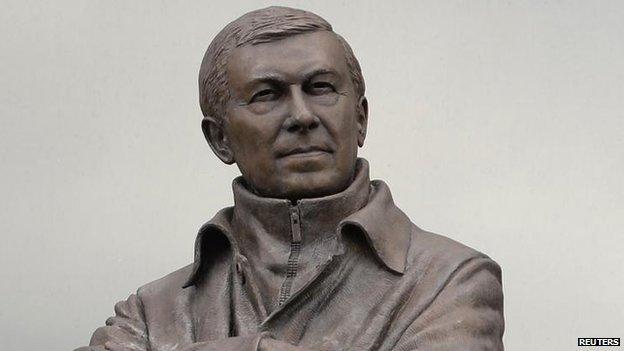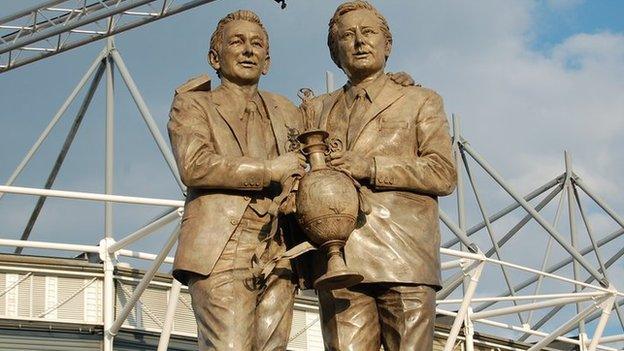Famous faces: Do places rush to honour their celebrity sons and daughters?
- Published

Tourist attractions for some, blue plaques can go unnoticed by others
Plaques and statues honouring famous people have long been used to attract tourists to the UK's towns and cities. But is there a danger in rushing to honour the living?
In London, you do not stand a chance unless you have been dead for at least 20 years.
Elsewhere in England, the situation is a bit more of a free-for-all.
Hundreds of plaques commemorating the contribution individuals have made to society are dotted around the country, often making ordinary family homes unlikely tourist attractions.
A plaque was unveiled in Stoke-on-Trent on Wednesday as part of Robbie Williams' 40th birthday celebrations, while in Manchester, one has been erected in honour of the animation studio where Danger Mouse was sketched.
Dr Dan Laughey, who teaches topics including celebrity and culture at Leeds Metropolitan University, is among those who believe the Williams plaque is a "bit premature".
English Heritage, which is responsible for London's scheme, stipulates that an individual has to have been dead for 20 years before they will be considered.
And Dr Laughey believes the main consideration in deciding whether to honour someone with a plaque or statue is whether their fame goes beyond "the here and now".
"They really should be kept for great people - for important figures, whose contribution to society actually crosses generations and periods of time," he says.
"It's just about conceivable for a living legend to deserve a blue plaque or statue but they're more likely to be very old before they deserve that.
"Entertainers can last beyond the here and now but not many do. Eric Morecambe has his statue in Morecambe and his impact probably has crossed generations.
"People still love watching Morecambe and Wise on television even though it's now more of a nostalgia thing."

There are plans for a statue of former prime minister Margaret Thatcher in her home town of Grantham

The Morecambe tribute to Eric Morecambe was unveiled in 1999

Sir Alex Ferguson's statue strikes a familiar pose outside Old Trafford

Brian Clough, honoured in Derby alongside Peter Taylor, has three statues dedicated to him
The English Heritage panel that judges proposals for London's blue plaque scheme meets three times a year and is due to unveil its latest honour this month.
Panel chairman Professor Ronald Hutton, external says its 20-year rule acts as a safeguard.
"The Jimmy Savile case lights up in neon the dangers of going on someone's pre-death reputation," he says.
Prof Hutton describes the panel's debate as "extremely lively but invariably polite".
"It's agonising making the choices," he says.
"Because the plaques are a national sign of affirmation of someone's historic role you really do have to get it right and there's always this nagging sense of doubt."
Statues in the UK are much rarer than in the past, Prof Hutton says.
"It was very much an 18th and 19th Century thing when Britons were trying to be ancient Romans.
"If you are a 20th Century celebrity you are most likely to have a blue and white ceramic plaque these days.
"That's the main reason people have become so devoted and fascinated by it."
Jez Nicholson helps run the Open Plaques, external website which hosts information about commemorations around the country.
'Claim to fame'
The site attracts about 4,000 visitors a week and one contributor has taken more than 1,400 photographs of plaques.
"Everybody has a claim to fame for their village or town and I think it's just local pride that makes people want to shout about it," Mr Nicholson says.
But just who the public should get to celebrate with a plaque or statue, Dr Laughey concludes, will always be up for debate.
"It's difficult to decide on legacy and greatness but I suppose the biggest test is the test of time. How long does someone live in the memory of people?
"There are debates to be had and there's no such thing as an absolute nailed on version of someone's life that everyone accepts."
- Published6 February 2014
- Published5 February 2014
- Published22 September 2013
- Published22 February 2013
- Published9 January 2013
- Published6 January 2013
- Published1 August 2012
- Published14 November 2011